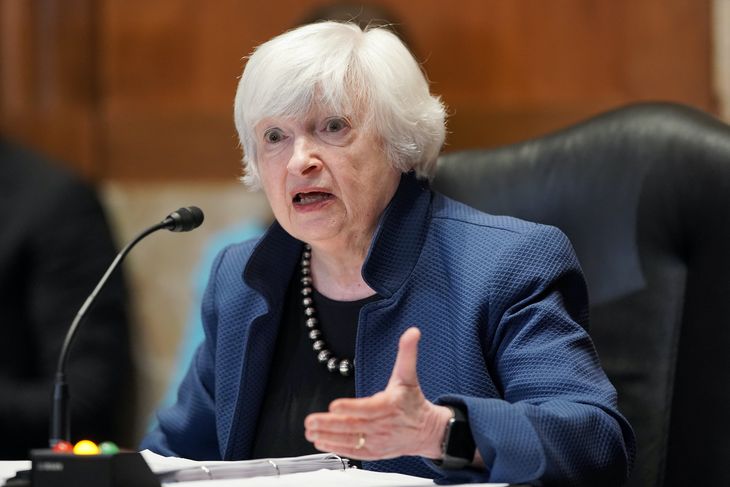02-24-2024_the_North American_Secretary_of_State.jpeg
President Javier Milei received the North American Secretary of State, Antony Blinken, at the Government House this Friday.
With this panorama, there is no doubt that the level of activity is on the way to collapse. And from a financial point of view, despite the slowdown evidenced by private surveys, the CER is unbeatable in the nominal race. Against this The demons of the exchange rate delay resurface under the 2% crawling peg guideline, so a part of the library hopes that “Toto” will accelerate crawling from March, perhaps double, and no more than April. What they fear is that the Government will abuse this as a tool to show a political triumph that inflation fell faster. For now, futures continue to adjust downwards. We will see.
Scenarios: goes well or goes wrong
The meetings between consultants and clients in recent days were much commented on, especially the one at EcoGo where attendees did nothing but praise the presentations of Marina dal Poggettoand something similar, although more trite, in the case of Ricardo Arriazu. But what is heard in all of them, more or less prestigious, is the summary of the scenarios, it goes well or it goes bad. There is no middle ground.
In this regard, if something indicates caution, it is the spirit with which the January tax data. According to the economist Martin Polo (Cohen), “you don’t have to celebrate a corner”, It was good data but caution should be taken when moving towards fiscal consolidation, because it does not seem sustainable since the mix shows improvement in income due to the devaluation and increase in the PAIS tax (if this foam is removed, the Treasury’s income has been falling by 12% in real terms, all recession effects) and the adjustment in spending, where no one was saved from the cut but Sitting at the box does not seem to be lasting, especially in the case of transfers to provinces, even the subsidies do not show the impact of the high rate.. In other words, the fiscal issue is still not clear, much less the path towards consolidation.
pesoss-dollar-dolarizacion.jpg

Depositphotos
The topic dollar, obviously, also on the menu of the meetings and there the “key dollar” focused attention since it is at the lowest levels, in real terms, of the last three years, and where the 80/20 exchange rate mix is no longer sustainable and The Staff Report already said something about this.
Within this mess, provincial bonds also appear in the eye of the storm, where only a few are saved from technical scrutiny due to their fiscal numbers. And speaking of presentations, a manager based in Miami burst into applause with Arriazu’s presentation with the people of BlackToro along with his right-hand man, Fernando Marengo, where it became clear that without the anti-inflationary stabilization plan being consolidated, the structural reforms, but without this stabilization does not have much life either. According to Arriazu’s vision, the first is better than expected while the second is facing great difficulties that were expected.
gita gopinath pink house

Gita Gopinath, number 2 at the IMF, at Casa Rosada. She expressed to Argentina the organization’s concerns about the social effects of the adjustment.
Telam
For the taste of these economists, the package sent was excessive; what is needed is to correct the problems that make the economy uncompetitive. They coincide with the exchange rate anchor as an instrument to stabilize and reduce the inflation rate, which requires a fiscal surplus plus the anchor. They hope to see how the war or internal struggle will behave to escape the adjustment, especially the governors and mayors. Here the issue is political-legislative and street governance. A colorful fact in the exchange between the North American manager and an Argentine colleague: from his last visit, to clients and to relax, to Punta del Este where they manage several offshore fortunes, José Ignacio’s prices seemed higher than those he faces in his native Florida.
Bond investments
At the time of “sinking in”, an operator explained to a London colleague, interested in the BOPREAL issue, that apparently in the first operations of the bond (BPJ25) on the BYMA screen everything would indicate that the market also values to series 2 as a provincial credit, well below the sovereign yields, despite not having the “AFIP put” which is one of the main incentives of series 1, due to the rapid recovery of the investment given which pays 50 dollars for every 100 nominal before the end of the year and before the payment of 4.7 billion dollars of Global Bonds and Bonares.
While the people at NEIX reported that they closed the “trade” of the Treasury bond with CER (TX26) armed at the end of January with a direct profit of almost 21%. The trade was originally set up to capture a reduction in the curvature of the CER curve. While this was observed, they believe this segment of the curve could have been reduced even further. Given that in the last tenders Finance was placing inflation-adjustable bonds (with a slight premium in the primary market) in the middle section of the curve, they have preferred to take profits from the short-term “trade.” And although CER bonds showed increases in recent days, the reaction was relatively modest to the January inflation data. At current prices it is preferable to take a position again in shorter bonds such as T4X4, they point out.
Milei’s Argentina, still off the investment radar
Although Milei’s libertarian landing transcends borders, Buenos Aires still remains off the massive radar of the big players, even from the agenda of illustrious figures such as the US Secretary of the Treasury, Janet Yellen, who will travel in the next few days to São Paulo to participate in the meetings and parallel events of Finance Ministers and Governors of Central Banks of the G20, where “Toto” will surely take advantage of the great deal of aid and support with the IMF, and then to Santiago de Chile.
There is already talk in Washington that during the G20 Yellen will promote the US leadership role within the multilateral system (to promote its national interests by expanding economic opportunities for the US and its trading partners). It will emphasize the importance of collective action to build on the economic progress achieved and boost the global economy in the long term, such as ongoing work to develop the Multilateral Development Banks, strengthen the IMF, address climate change, and confront the problem of sovereign debt.
It will also work to deepen ties with Brazil, an important economic partner, as well as other key emerging markets.
Janet Yellen

US Treasury Secretary Janet Yellen.
Photo: Getty Images
In the middle is the second anniversary of Russia’s invasion of Ukraine Therefore, Yellen will reaffirm the Biden Administration’s commitment to the Ukrainian government. In Chile, Yellen will deepen the bilateral economic relationship, focusing on Chile’s important contribution to the green transition, including its domestic policies to incentivize renewable energy and its role as a supplier of critical minerals. It must be remembered that the US and Chile have a long-standing relationship reinforced by a free trade agreement and a new tax treaty: the first bilateral tax treaty to come into force in more than a decade.
A few days later, Santiago will also be the scene of a road show of the main investment funds in Luxembourg and the region organized by ALFI after also holding it in São Paulo days ago.
And speaking of Europe, two prominent bankers commented on the new chapter of the Santander-Iran novel. According to one of them, in the Spanish newspaper Cinco Días, The Spanish entity would have acknowledged to the US SEC that it has 17 blocked accounts linked to Iran and that belong to the United Kingdom, Belgium and Brazil after a series of clients were sanctioned for terrorism in the US for their links. with the Iranian regime.
Santander, according to the newspaper, has already taken measures to withdraw from the Iranian market, such as closing its representative office in Iran and ceasing all banking activities there, including correspondent relations, collecting deposits from Iranian entities and issuing letters of export credit. In the case of the United Kingdom, Santander UK maintains blocked seven accounts of five clients who are currently subject to the US Specially Designated Global Terrorist (SDGT) sanctions program; and in the case of Belgium, the accounts have been blocked since 2008, and there are three others in Brazil.
All of this occurs in the context of a few weeks ago, when the Financial Times published that Iran had used accounts in Santander and Lloyds to covertly move money and thus evade sanctions. Accounts are suspected to British front companies secretly owned by a sanctioned Iranian petrochemical company based near Buckingham Palace (the Petrochemical Commercial Company).
Source: Ambito
I am a 24-year-old writer and journalist who has been working in the news industry for the past two years. I write primarily about market news, so if you’re looking for insights into what’s going on in the stock market or economic indicators, you’ve come to the right place. I also dabble in writing articles on lifestyle trends and pop culture news.




